Coalition deal
John Cherian
The eight-month-long impasse over
forming a new Iraqi Government ends following the intervention of the
United States and Iran
The major political blocs of Iraq seem to have finally reached an
agreement to form a Government. The elections held in March 2010 threw
up a hung Parliament. Since then the Iraqi Parliament has only met
twice. In October, the Supreme Court ordered that Parliament should meet
and elect a new government. Iraqis have blamed the political impasse for
the deteriorating law and order situation and the economic mess that the
country faces. Sectarian attacks have risen to an alarming
|
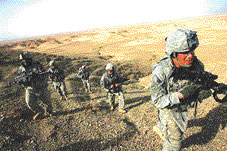
US soldiers in Iraq |
level in recent months, culminating in widespread attacks on
Christians.
The inability of the competing factions to come to an understanding
on the issue of sharing power was the reason behind Nouri al-Maliki
continuing as caretaker Prime Minister for the past eight months. He had
anyway made it clear at the outset that he would try his best to hold on
to the job.
The Shia parties, which together control the majority of seats in
Parliament, were reluctant to see power pass to the Iraqiya bloc, which
was overwhelmingly backed by the minority Sunnis. This helped al-Maliki’s
game plan to hold on to power by hook or by crook. Many Iraqis have
questioned the very conduct of the parliamentary election, which they
feel legitimizes the occupation of the country.
|
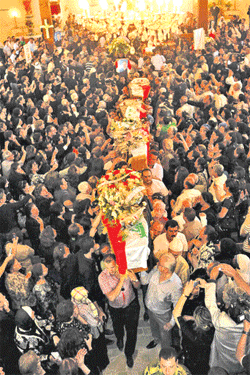
Mourners carry the coffins of slain Christians in Baghdad on
November 2. The victims were killed when gunmen stormed a church
during Sunday mass and took the entire congregation hostage |
Finally, it was outside intervention, notably by United States and
Iran, that brought an end to the long-running political impasse.
Washington put pressure on former Prime Minister Iyad Allawi, the leader
of the Iraqiya bloc, to agree to the continuation of al-Maliki in the
top job. Until recently, Allawi had insisted that he had the right to
stake a claim for the prime ministership as his bloc had the largest
number of seats in the National Assembly. It won 91 seats while al-Maliki’s
Shia-dominated grouping – the State of Law Coalition – got 89 seats in
the 325-member Council of Representatives.
Not that Allawi had too many options left. The State of Law
Coalition, although slightly behind the Iraqiya in numbers, had
persuaded important players such as the radical cleric Moqtada al-Sadr
to support al-Maliki. An agreement in May with the Iraqi National
Alliance (INA), of which al-Sadr’s party is a constituent, strengthened
the formation. With the INA’s 70 members, the coalition was close to a
majority.
There were fears that more legislators would defect to the coalition,
helping al-Maliki to gain a majority. Any further delay on Allawi’s part
would have left him in the cold. Such a prospect was also not acceptable
to the Obama administration as many of the parties supporting al-Maliki
were seen to be close to Iran. Iran is said to have used its influence
to make al-Sadr reverse his stance.
Immediately, after the elections, al-Sadr had said that his 40-strong
group in Parliament would not be supporting al-Maliki. The Iraqi Prime
Minister had authorized the use of military force against the Sadrists
not so long ago. But a visit by al-Maliki to the Iranian holy city of
Qom in October, where al-Sadr currently resides, coupled with his praise
for Iran, changed the political situation.
It was the decision of the Sadrist bloc to join the Government that
sent alarm bells ringing in Washington. Sadr was Washington’s top bogey
man in Iraq until recently. There was a fear that Iran’s influence in
the corridors of power in Baghdad would increase even further. During
his visit to Teheran, al-Maliki had described the Iraq-Iran relationship
as “strategic” and called for a further deepening of it.
America’s puppet
|
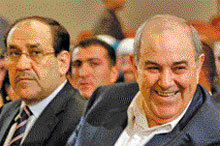
Prime Minister Nouri al-Maliki and former Iraqi premier and head
of the secular Iraqiya coalition Iyad Allawi |
Al-Sadr from the outset was anyway against Allawi, who is widely
viewed as the most pliable of America’s puppets in the region. Allawi
was a “CIA asset” when the organization was trying to destabilize the
Iraqi Government led by Saddam Hussein.
The Governments of Iraq’s Sunni-dominated neighbours immediately
swung into diplomatic manoeuvres in order to ensure that Iran did not
get more leverage in Iraqi politics. The Obama administration was
particularly concerned that its bete noire al-Sadr would have a crucial
say in the running of the Government if its proxies were excluded from
the proposed unity Government. President Obama along with Vice-President
Joseph Biden personally worked the phone lines to convince Allawi and
the Kurdish parties to join the new Government. Under the deal that has
been worked out, Allawi is to head the new autonomous National Council
for Strategic Policy.
The American media have reported that Obama telephoned Iraqi
President Jalal Talabani to request him to step aside in favour of
Allawi. The Kurdish parties, as is evident, are extremely reluctant to
give up the prestigious, albeit ceremonial, post of the President. The
new Speaker, Usama al-Najafi, a Sunni politician, is from the Iraqiya
grouping. Allawi’s candidate will also be the new Foreign Minister, a
post currently held by the Kurdish bloc. Saleh al-Muttlak, an outspoken
critic of Iran, is tipped to be the Foreign Minister. The Iraqiya bloc,
to whom all of them belong, claims to have a secular agenda.
Otherwise, Iraqi politicians under American tutelage have stuck to
the post-Saddam power-sharing formula, under which the President has to
be a Kurd, while the Prime Minister will be a Shia. Under the Iraqi
Constitution, Prime Minister’s post is the most important one, with all
key decision-making powers resting with him. The National Council for
Strategic Policy will have a big role to play in policymaking if the
Americans and the Iraqi politicians who are opposed to al-Maliki have
their way.
|
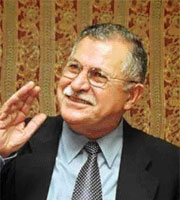
President Jalal Talabani |
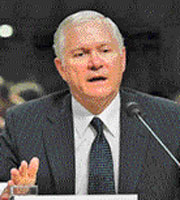
Defence Secretary Robert Gates |
Al-Maliki’s strong-arm tactics against the Kurds and the Sunnis had
generated a lot of resentment. Allawi’s job is to ensure that al-Maliki
is not given a free hand and is subjected “to checks and balances”.
American officials also claim that the supporters of al-Sadr will not be
given any ministerial posts.
Washington’s priority
Most commentators said that Washington and Teheran should be happy
with the composition of the new Iraqi Government. Politicians close to
both the parties will be playing key roles, ensuring that their
respective interests are not compromised.
Washington’s immediate priority is to get the new Government to sign
a security agreement so that the US can retain its big military bases
and keep its troops in Iraq beyond 2011, the deadline Washington had
earlier set for withdrawal of its troops.
Defence Secretary Robert Gates recently signalled that the US hopes
to stay in Iraq beyond 2011. He said the US was waiting to hold talks
with the Iraqi Government on the issue but insisted that the “initiative
clearly needs to come from the Iraqis; we are open to discussing it”.
The Obama administration is no doubt hoping that the new Government
it has helped to cobble up will soon come up with this ‘initiative’.
Some 50,000 US troops remain in Iraq.
The country’s airspace and coastline are also under US control. A
State Department document has published the views of senior diplomats
and military analysts who claim that the withdrawal of troops in 2011
will lead to the crumbling of ‘hard-won military gains’ in Iraq. On the
other hand, Iran’s supreme ruler Ayatollah Ali Khamenei, after a meeting
with the visiting Iraqi Prime Minister, expressed the hope that “the
almighty God ends America’s menace over Iraq as soon as possible”. He
said the withdrawal of US troops would solve Iraq’s problems.
The Frontline |



